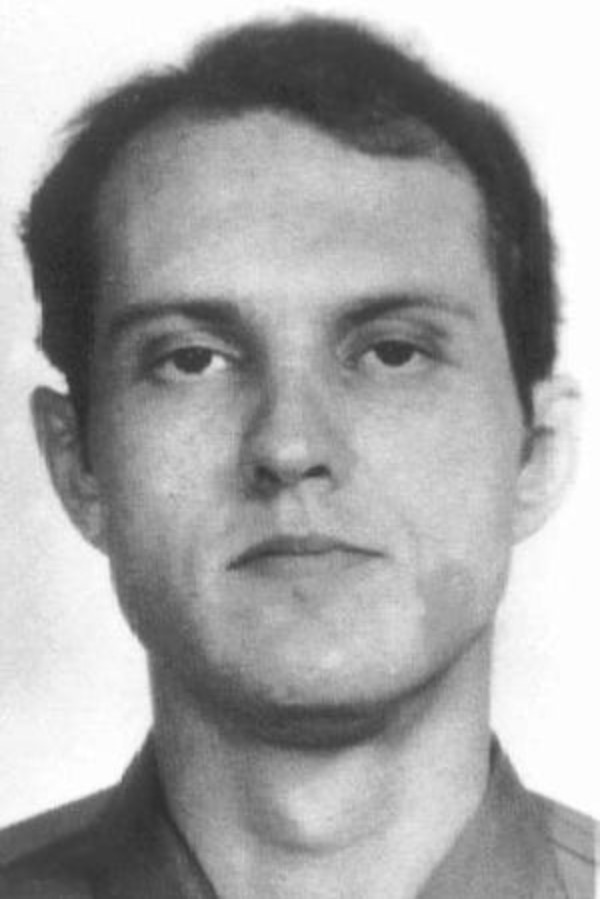Jesse Joseph Tafero (October 12, 1946 – May 4, 1990), was convicted of murder and executed via electric chair in the state of Florida for the murders of Florida Highway Patrol officer Phillip Black and Donald Irwin, a visiting Canadian constable and friend of Black. The officers were killed during a traffic stop where Tafero, his girlfriend Sunny Jacobs, and their children were passengers. The driver, Walter Rhodes, confessed to shooting the officers after Tafero's execution.
Mostrar mensagens com a etiqueta pena de norte. Mostrar todas as mensagens
Mostrar mensagens com a etiqueta pena de norte. Mostrar todas as mensagens
segunda-feira, maio 04, 2020
Há trinta anos um inocente foi excutado barbaramente na cadeira elétrica
Jesse Joseph Tafero (October 12, 1946 – May 4, 1990), was convicted of murder and executed via electric chair in the state of Florida for the murders of Florida Highway Patrol officer Phillip Black and Donald Irwin, a visiting Canadian constable and friend of Black. The officers were killed during a traffic stop where Tafero, his girlfriend Sunny Jacobs, and their children were passengers. The driver, Walter Rhodes, confessed to shooting the officers after Tafero's execution.
The crime, trial, and execution
On the morning of February 20, 1976, Black and Irwin approached a car
parked at a rest stop for a routine check. Tafero, his partner Sonia
"Sunny" Jacobs, her two children (ages 9 years and 10 months), and
Walter Rhodes were found asleep inside. Tafero had previously been in
prison and was on probation. Black saw a gun lying on the floor inside
the car. He woke the occupants and had first Rhodes then Tafero come out
of the car.
According to Rhodes, Tafero then shot both Black and Irwin with the
gun, (which was legally registered to Jacobs who bought guns on behalf
of Tafero - he couldn't legally apply for a license because of his
record) and led the others into the police car and fled the scene.
According to Tafero, Rhodes shot the officers and handed the gun to him
so that Rhodes could drive.
They later disposed of the police car and kidnapped a man and stole his car. All three were arrested after being caught in a roadblock. When they were arrested, the gun was found in Tafero's waistband.
Gunpowder tests found residue on Rhodes consistent with “having
discharged a weapon”, residue on Tafero consistent with “handling an
unclean or recently discharged weapon, or possibly discharging a
weapon”, and residue on Jacobs and her son consistent with “having
handled an unclean or recently discharged weapon”.
Prior to his conviction for murder, Tafero had been convicted of
attempted robbery and "crimes against nature" when he was 20 years old.
Rhodes entered into a plea agreement for a reduced sentence of second
degree murder in exchange for his testimony against Tafero and Jacobs.
At their trial, he testified that Jacobs fired first from the back
seat, then Tafero took the gun from her and shot the two officers.
Rhodes later recanted his testimony on three occasions, in 1977, 1979,
and 1982, stating that he shot the policemen, but ultimately reverted to
his original testimony.
Tafero and Jacobs were convicted of capital murder and were sentenced to death
while Rhodes was sentenced to 3 life sentences. He was released in 1994
following parole for good behavior. The children were placed in the
care of Sunny Jacobs' parents until their deaths in a 1982 plane crash.
The children were then separated and Sunny's younger child, Christina,
was placed into foster care with a friend of Jacobs. Sunny's older
child, Eric, who was in his mid teens, first resided with Sonia's
brother Alan, then lived on his own, struggling to survive by working at
a pizza restaurant and various odd jobs.
Tafero and Jacobs continued their relationship through letters while
serving time in the prison. Because there was no death row for women in
Florida, Jacobs was put into solitary confinement for the first five
years of her imprisonment, let out only once or twice a week for
exercise. She learned yoga to pass the time, and after being moved to
the general prison population, began teaching yoga to other prisoners.
Although the jury had recommended a life sentence for Jacobs, Judge
Daniel Futch, known as “Maximum Dan” for his reputation for tough
sentences, imposed the death sentence.
In 1981, the Florida Supreme Court commuted Jacobs' sentence to life in
prison, holding that Futch lacked sufficient basis to override the
jury's sentencing recommendation.
Tafero was to be executed by electrocution. The machine, dubbed "Old Sparky",
malfunctioned, causing six-inch flames to shoot out of Tafero's head. A
member of the execution team had used a synthetic sponge rather than a sea sponge,
which is necessary to provide greater conductivity and a quick death.
In all, three jolts of electricity were required to render Tafero dead, a
process that took seven minutes.
Prison inmates later claimed that 'Old Sparky' was 'fixed' and tampered
with to make Tafero's execution more like torture. One close inmate
friend of Tafero later said he could smell the burning flesh of his
friend for days after.
Aftermath
Rhodes had confessed to the shootings after Tafero's death.
The case became a cause célèbre among death penalty opponents, who cited the brutal circumstances of his execution as reasons it should be abolished.
Filmmaker Micki Dickoff made a crime drama on the case entitled “In the Blink of an Eye,” which aired as an ABC movie of the week in 1996. Sonia "Sunny" Jacobs, even though she had not been exonerated, is featured in The Exonerated, a made-for-cable television film, first aired on the former CourtTV cable television network on January 27, 2005.
When her death sentence was overturned in 1981, she was sentenced to
life with a 25 year minimum mandatory sentence. In 1992 when her case
was reversed on appeal, she pled to second degree murder and was
released on time served. In 2011, Jacobs was married to Peter Pringle, who had been exonerated after being sentenced to death in Ireland.
in Wikipédia
Postado por
Fernando Martins
às
00:30
0
bocas
![]()
Marcadores: cadeira elétrica, inocente, Jesse Tafero, pena de norte, tortura, USA
domingo, maio 04, 2014
Há 24 anos o inocente Jesse Tafero e a cadeira elétrica provaram que esta era um instrumento de tortura e não de execuções
Jesse Joseph Tafero (October 12, 1946 – May 4, 1990), was convicted of murder and executed via electric chair in the state of Florida for the murders of Florida Highway Patrol officer Phillip Black and Donald Irwin, a visiting Canadian constable and friend of Black. The officers were killed during a traffic stop where Tafero, his girlfriend Sunny Jacobs, and their children were passengers. The driver, Walter Rhodes, confessed to shooting the officers after Tafero's execution.
The crime, trial, and execution
On the morning of February 20, 1976, Black and Irwin approached a car
parked at a rest stop for a routine check. Tafero, his partner Sonia
"Sunny" Jacobs, her two children (ages 9 years and 10 months), and
Walter Rhodes were found asleep inside. Tafero had previously been in
prison and was on probation. Black saw a gun lying on the floor inside
the car. He woke the occupants and had first Rhodes then Tafero come out
of the car.
According to Rhodes, Tafero then shot both Black and Irwin with the
gun, (which was legally registered to Jacobs who bought guns on behalf
of Tafero - he couldn't legally apply for a license because of his
record) and led the others into the police car and fled the scene.
According to Tafero, Rhodes shot the officers and handed the gun to him
so that Rhodes could drive.
They later disposed of the police car and kidnapped a man and stole his car. All three were arrested after being caught in a roadblock. When they were arrested, the gun was found in Tafero's waistband.
Gunpowder tests found residue on Rhodes consistent with “having
discharged a weapon”, residue on Tafero consistent with “handling an
unclean or recently discharged weapon, or possibly discharging a
weapon”, and residue on Jacobs and her son consistent with “having
handled an unclean or recently discharged weapon”.
Prior to his conviction for murder, Tafero had been convicted of
attempted robbery and "crimes against nature" when he was 20 years old.
Rhodes entered into a plea agreement for a reduced sentence of second
degree murder in exchange for his testimony against Tafero and Jacobs.
At their trial, he testified that Jacobs fired first from the back
seat, then Tafero took the gun from her and shot the two officers.
Rhodes later recanted his testimony on three occasions, in 1977, 1979,
and 1982, stating that he shot the policemen, but ultimately reverted to
his original testimony.
Tafero and Jacobs were convicted of capital murder and were sentenced to death
while Rhodes was sentenced to 3 life sentences. He was released in 1994
following parole for good behavior. The children were placed in the
care of Sunny Jacobs' parents until their deaths in a 1982 plane crash.
The children were then separated and Sunny's younger child, Christina,
was placed into foster care with a friend of Jacobs. Sunny's older
child, Eric, who was in his mid teens, first resided with Sonia's
brother Alan, then lived on his own, struggling to survive by working at
a pizza restaurant and various odd jobs.
Tafero and Jacobs continued their relationship through letters while
serving time in the prison. Because there was no death row for women in
Florida, Jacobs was put into solitary confinement for the first five
years of her imprisonment, let out only once or twice a week for
exercise. She learned yoga to pass the time, and after being moved to
the general prison population, began teaching yoga to other prisoners.
Although the jury had recommended a life sentence for Jacobs, Judge
Daniel Futch, known as “Maximum Dan” for his reputation for tough
sentences, imposed the death sentence.
In 1981, the Florida Supreme Court commuted Jacobs' sentence to life in
prison, holding that Futch lacked sufficient basis to override the
jury's sentencing recommendation.
Tafero was to be executed by electrocution. The machine, dubbed "Old Sparky",
malfunctioned, causing six-inch flames to shoot out of Tafero's head. A
member of the execution team had used a synthetic sponge rather than a sea sponge,
which is necessary to provide greater conductivity and a quick death.
In all, three jolts of electricity were required to render Tafero dead, a
process that took seven minutes.[8]
Prison inmates later claimed that 'Old Sparky' was 'fixed' and tampered
with to make Tafero's execution more like torture. One close inmate
friend of Tafero later said he could smell the burning flesh of his
friend for days after.
Aftermath
The case became a cause célèbre among death penalty opponents, who cited the brutal circumstances of his execution as reasons it should be abolished.
Filmmaker Micki Dickoff made a crime drama on the case entitled “In the Blink of an Eye,” which aired as an ABC movie of the week in 1996. Sonia "Sunny" Jacobs, even though she had not been exonerated, is featured in The Exonerated, a made-for-cable television film, first aired on the former CourtTV cable television network on January 27, 2005.
When her death sentence was overturned in 1981, she was sentenced to
life with a 25 year minimum mandatory sentence. In 1992 when her case
was reversed on appeal, she pled to second degree murder and was
released on time served. In 2011, Jacobs was married to Peter Pringle, who had been exonerated after being sentenced to death in Ireland.
in Wikipédia
Postado por
Fernando Martins
às
02:40
0
bocas
![]()
Marcadores: cadeira elétrica, inocente, Jesse Tafero, pena de norte, tortura, USA
Subscrever:
Mensagens (Atom)



